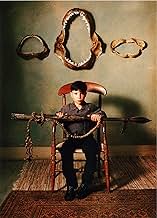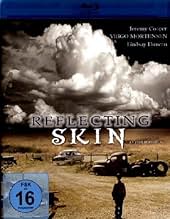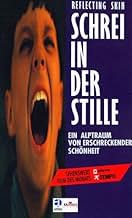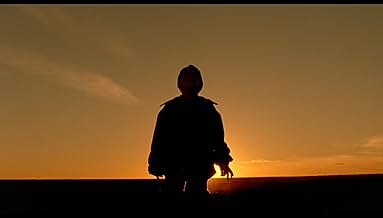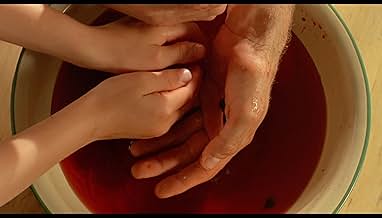In the 1950s, a young boy living with his troublesome family in rural USA fantasizes that a neighboring widow is actually a vampire, responsible for a number of disappearances in the area.In the 1950s, a young boy living with his troublesome family in rural USA fantasizes that a neighboring widow is actually a vampire, responsible for a number of disappearances in the area.In the 1950s, a young boy living with his troublesome family in rural USA fantasizes that a neighboring widow is actually a vampire, responsible for a number of disappearances in the area.
- Awards
- 6 wins & 3 nominations total
Jason Wolff
- Cadillac Driver
- (as Jason Wolfe)
- Director
- Writer
- All cast & crew
- Production, box office & more at IMDbPro
Featured reviews
Reflecting Skin is in many ways a unique creation. It operates at many levels, each of which should be taken on its own terms and understood within its own logic. Devastating social critique is entangled together with brilliantly shot natural landscapes (especially the combination of azure skies and sweeping fields of golden wheat). Dark and semi-psychotic scenes of Seth's father's self-immolation are entwined with the gentle lyricism of Cameron's "falling in love" with the "vampire woman," Dolphin Blue. Taken together, all these elements produce a dark, unsettling, relentlessly haunting atmosphere of the most profound spiritual crisis. Reflecting Skin is about the rock-bottom of socio-cultural devastation, it is about the wasteland lying inside each of us.
Philip Ridley shows us the isolated world totally devoid of all GENUINE sense of moral direction. The actor who plays a 9-year old Seth is absolutely excellent in portraying a frightened, well-meaning rural boy who has already absorbed all the unspeakable cruelty of his family and wider local milieu. The greatest nighmare of the film, it seems to me, is the destructively stubborn denial within which all characters are deeply and inextricably mired. There is nothing they are afraid more of than looking at themselves, at the profound evil which had already turned their souls into the most frightening desert. They are prepared to look around for vampires, witches and other incarnations of evil rather than to confront the layers of hypocrisy, sanctimony, and callousness within which they are hopelessly bogged down. They are blind to their own faults but are filled with immeasurable hate towards the "evil forces" out there. One is simply astonished at how successfully Ridley portrays the reservoirs of hatred and existential frustration hovering over the settlement. The movie traces how this hatred, this stubborn blindness progressively corrodes and ruins an impoverished rural community in the mid1950s. This movie is in many ways an examination of the local and deeply psychological sources of fascism (not in its more historical and specific meaning but as a cultural phenomenon of the modern world). Seth's desperate shriek for "salvation" amid the rays of the slowly setting sun and clouds of dust is perhaps the most powerful and unsettling scene in the film. Yet, watch closely: Seth's face is not covered with tears and genuine grief! His soul has been turned into stone -- he has grown to accept the ubiquity of death and cruelty. He will grow up to be a truly scary human being, able to kill and plunder with no remorse or doubt.
Great cinematographic gem. Should be appreciated by everybody interested in challenging, controversial, and ambiguous art. Profound social and even religious message about the evils of sanctimonious fundamentalism of any type of faith.
Philip Ridley shows us the isolated world totally devoid of all GENUINE sense of moral direction. The actor who plays a 9-year old Seth is absolutely excellent in portraying a frightened, well-meaning rural boy who has already absorbed all the unspeakable cruelty of his family and wider local milieu. The greatest nighmare of the film, it seems to me, is the destructively stubborn denial within which all characters are deeply and inextricably mired. There is nothing they are afraid more of than looking at themselves, at the profound evil which had already turned their souls into the most frightening desert. They are prepared to look around for vampires, witches and other incarnations of evil rather than to confront the layers of hypocrisy, sanctimony, and callousness within which they are hopelessly bogged down. They are blind to their own faults but are filled with immeasurable hate towards the "evil forces" out there. One is simply astonished at how successfully Ridley portrays the reservoirs of hatred and existential frustration hovering over the settlement. The movie traces how this hatred, this stubborn blindness progressively corrodes and ruins an impoverished rural community in the mid1950s. This movie is in many ways an examination of the local and deeply psychological sources of fascism (not in its more historical and specific meaning but as a cultural phenomenon of the modern world). Seth's desperate shriek for "salvation" amid the rays of the slowly setting sun and clouds of dust is perhaps the most powerful and unsettling scene in the film. Yet, watch closely: Seth's face is not covered with tears and genuine grief! His soul has been turned into stone -- he has grown to accept the ubiquity of death and cruelty. He will grow up to be a truly scary human being, able to kill and plunder with no remorse or doubt.
Great cinematographic gem. Should be appreciated by everybody interested in challenging, controversial, and ambiguous art. Profound social and even religious message about the evils of sanctimonious fundamentalism of any type of faith.
Trying to describe THE REFLECTING SKIN is impossible. You must experience it for yourself. I can say that it's about a kid named Seth. Seth does something horrible to a frog and then some really bad things happen to Seth,involving a mummified baby,his neighbor- a woman named Dolphin Blue-and a pack of teenagers in an ominous black car. THE REFLECTING SKIN is a pastoral film,but underneath the
beauty is genuine menace.
beauty is genuine menace.
Really beautiful cinematography here, with the gorgeous billowing waves of amber wheat under azure skies that go on forever. The pacing is slow and the story is ambiguous, but I liked the themes of how the world is perceived as a child, and the inevitable time when the illusions of childhood are set aside. Who are the monsters in life, it seems to ask, the vampires of our horror stories, or people who abuse the powerless and wage war, despite this beautiful world all around them? It's ambitious and artistic, but the myriad subplots in its story didn't quite keep up for me.
The ambiguity defines this webb of many subplots. A splendid cinematography and fall of a boy, step by step from childhood. Difficult to define it, it is more than a horror and maybe a dark trip across near realities comfortable to ignore. Important - the gorgeous cinematography and the inspired performances.
I only read the most recent 12 reviews, but it seems you either really appreciate this film or you think it sucks. Apparently, some folks see art in the tragic and angst-ridden characters, and others are disgusted by their actions and the depressing imagery. Personally, my motives were not too sophisticated: I found it in the "horror" section at the video store and it looked pretty stylish and of course, Aragorn was in it, so I said what the heck. I thought the film, though disturbing, was indeed a fascinating and thought-provoking piece of cinematic art.
Anyway, I'm wondering if Philip Ridley was commenting on the narcissism, arrogance, violence, and corruption of U.S. culture. Not that others couldn't be accused of similar vices, but... I think the boy Seth and the other lead characters symbolize our national conscience. We run around blowing up frogs and tearing up peoples' property with no remorse, then create our own moral/spiritual sources to console us out of empty, dead things (like a stillborn child). We wallow in our domestic dysfunctions, while excelling at denial about them (like the nutty mother). We like a good witch hunt, accusing the depressed widow or the agonized former pedophile, while ignoring the obvious handsome suspects in the nice Caddy. We flit around wrapped in our flag thinking we're innocent, all the while nuking children in war only to focus on how their radiated skin looks like a mirror in which we can see our lovely reflections. But someone else gets the last laugh, since we're all self-destructing as a result of it all, and while at first Seth's screaming frenzy as the finale confused me, I realize now it's a fitting end to that interpretation.
Or something like that. It might just be about a bored rural kid with no conscience and a wild imagination whose failure to tell the truth ends up hurting everyone around him. Or about the price of tea in China. It's worth the view, though, if you like Gothic thrillers.
Anyway, I'm wondering if Philip Ridley was commenting on the narcissism, arrogance, violence, and corruption of U.S. culture. Not that others couldn't be accused of similar vices, but... I think the boy Seth and the other lead characters symbolize our national conscience. We run around blowing up frogs and tearing up peoples' property with no remorse, then create our own moral/spiritual sources to console us out of empty, dead things (like a stillborn child). We wallow in our domestic dysfunctions, while excelling at denial about them (like the nutty mother). We like a good witch hunt, accusing the depressed widow or the agonized former pedophile, while ignoring the obvious handsome suspects in the nice Caddy. We flit around wrapped in our flag thinking we're innocent, all the while nuking children in war only to focus on how their radiated skin looks like a mirror in which we can see our lovely reflections. But someone else gets the last laugh, since we're all self-destructing as a result of it all, and while at first Seth's screaming frenzy as the finale confused me, I realize now it's a fitting end to that interpretation.
Or something like that. It might just be about a bored rural kid with no conscience and a wild imagination whose failure to tell the truth ends up hurting everyone around him. Or about the price of tea in China. It's worth the view, though, if you like Gothic thrillers.
Did you know
- TriviaDirector Philip Ridley stated that he hand painted all the wheat yellow because he preferred the look of it
- Quotes
Cameron Dove: Why don't you go play with your friends?
Seth Dove: They're all dead.
- Alternate versionsAccording to the Technical Specifications link for this movie, there are two different versions of this film: 1 hr 36 min (96 min) and 1 hr 55 min (115 min) (Ontario) (Canada).
- How long is The Reflecting Skin?Powered by Alexa
Details
Box office
- Gross US & Canada
- $17,042
- Opening weekend US & Canada
- $5,958
- Jun 30, 1991
- Gross worldwide
- $17,042
- Runtime1 hour 36 minutes
- Color
- Aspect ratio
- 1.85 : 1
Contribute to this page
Suggest an edit or add missing content



